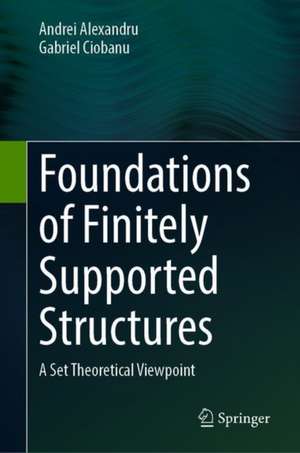Foundations of Finitely Supported Structures: A Set Theoretical Viewpoint
Autor Andrei Alexandru, Gabriel Ciobanuen Limba Engleză Hardback – 21 iul 2020
In the framework of finitely supported sets, the authors analyze the consistency of various forms of choice and related results. They introduce and study the notion of 'cardinality' by presenting various order and arithmetic properties. Finitely supported partially ordered sets, chain complete sets, lattices and Galois connections are studied, and new fixed point, calculability and approximation properties are presented. In this framework, the authors study the finitely supported L-fuzzysubsets of a finitely supported set and the finitely supported fuzzy subgroups of a finitely supported group. Several pairwise non-equivalent definitions for the notion of 'infinity' (Dedekind infinity, Mostowski infinity, Kuratowski infinity, Tarski infinity, ascending infinity) are introduced, compared and studied in the new framework. Relevant examples of sets that satisfy some forms of infinity while not satisfying others are provided. Uniformly supported sets are analyzed, and certain surprising properties are presented. Finally, some variations of the finite support requirement are discussed.
The book will be of value to researchers in the foundations of set theory, algebra and logic.
| Toate formatele și edițiile | Preț | Express |
|---|---|---|
| Paperback (1) | 641.67 lei 6-8 săpt. | |
| Springer International Publishing – 22 iul 2021 | 641.67 lei 6-8 săpt. | |
| Hardback (1) | 647.93 lei 6-8 săpt. | |
| Springer International Publishing – 21 iul 2020 | 647.93 lei 6-8 săpt. |
Preț: 647.93 lei
Preț vechi: 809.92 lei
-20% Nou
Puncte Express: 972
Preț estimativ în valută:
124.02€ • 134.76$ • 104.24£
124.02€ • 134.76$ • 104.24£
Carte tipărită la comandă
Livrare economică 21 aprilie-05 mai
Preluare comenzi: 021 569.72.76
Specificații
ISBN-13: 9783030529611
ISBN-10: 3030529614
Ilustrații: XI, 204 p. 2 illus.
Dimensiuni: 155 x 235 mm
Greutate: 0.49 kg
Ediția:1st ed. 2020
Editura: Springer International Publishing
Colecția Springer
Locul publicării:Cham, Switzerland
ISBN-10: 3030529614
Ilustrații: XI, 204 p. 2 illus.
Dimensiuni: 155 x 235 mm
Greutate: 0.49 kg
Ediția:1st ed. 2020
Editura: Springer International Publishing
Colecția Springer
Locul publicării:Cham, Switzerland
Cuprins
The World of Structures with Finite Supports.- Finitely Supported Sets: Formal Results.- Choice Principles in Finitely Supported Mathematics.- Connections with Tarski’s Concept of Logicality.- Partially Ordered Sets in Finitely Supported Mathematics.- Lattices in Finitely Supported Mathematics.- Constructions of Lattices in Finitely Supported Mathematics.- Galois Connections in Finitely Supported Mathematics.- Several Forms of Infinity in Finitely Supported Mathematics.- Properties of Atoms in Finitely Supported Mathematics.- Freshness in Finitely Supported Mathematics.- Abstraction in Finitely Supported Mathematics.- Relaxing the Finite Support Requirement.
Textul de pe ultima copertă
This book presents a set theoretical development for the foundations of the theory of atomic and finitely supported structures. It analyzes whether a classical result can be adequately reformulated by replacing a 'non-atomic structure' with an 'atomic, finitely supported structure’. It also presents many specific properties, such as finiteness, cardinality, connectivity, fixed point, order and uniformity, of finitely supported atomic structures that do not have non-atomic correspondents.
In the framework of finitely supported sets, the authors analyze the consistency of various forms of choice and related results. They introduce and study the notion of 'cardinality' by presenting various order and arithmetic properties. Finitely supported partially ordered sets, chain complete sets, lattices and Galois connections are studied, and new fixed point, calculability and approximation properties are presented. In this framework, the authors study the finitely supported L-fuzzysubsets of a finitely supported set and the finitely supported fuzzy subgroups of a finitely supported group. Several pairwise non-equivalent definitions for the notion of 'infinity' (Dedekind infinity, Mostowski infinity, Kuratowski infinity, Tarski infinity, ascending infinity) are introduced, compared and studied in the new framework. Relevant examples of sets that satisfy some forms of infinity while not satisfying others are provided. Uniformly supported sets are analyzed, and certain surprising properties are presented. Finally, some variations of the finite support requirement are discussed.
The book will be of value to researchers in the foundations of set theory, algebra and logic.
In the framework of finitely supported sets, the authors analyze the consistency of various forms of choice and related results. They introduce and study the notion of 'cardinality' by presenting various order and arithmetic properties. Finitely supported partially ordered sets, chain complete sets, lattices and Galois connections are studied, and new fixed point, calculability and approximation properties are presented. In this framework, the authors study the finitely supported L-fuzzysubsets of a finitely supported set and the finitely supported fuzzy subgroups of a finitely supported group. Several pairwise non-equivalent definitions for the notion of 'infinity' (Dedekind infinity, Mostowski infinity, Kuratowski infinity, Tarski infinity, ascending infinity) are introduced, compared and studied in the new framework. Relevant examples of sets that satisfy some forms of infinity while not satisfying others are provided. Uniformly supported sets are analyzed, and certain surprising properties are presented. Finally, some variations of the finite support requirement are discussed.
The book will be of value to researchers in the foundations of set theory, algebra and logic.
Caracteristici
Presents a set theoretical development for the foundations of the theory of finitely supported sets and structures Authors collect various results on topic and present them in a uniform manner Valuable for researchers in mathematical logic and computer science logic
